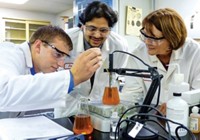Advertisement
Grab your lab coat. Let's get started
Welcome!
Welcome!
Create an account below to get 6 C&EN articles per month, receive newsletters and more - all free.
It seems this is your first time logging in online. Please enter the following information to continue.
As an ACS member you automatically get access to this site. All we need is few more details to create your reading experience.
Not you? Sign in with a different account.
Not you? Sign in with a different account.
ERROR 1
ERROR 1
ERROR 2
ERROR 2
ERROR 2
ERROR 2
ERROR 2
Password and Confirm password must match.
If you have an ACS member number, please enter it here so we can link this account to your membership. (optional)
ERROR 2
ACS values your privacy. By submitting your information, you are gaining access to C&EN and subscribing to our weekly newsletter. We use the information you provide to make your reading experience better, and we will never sell your data to third party members.
Careers
No Substitute For Experience
Chemical engineering students at all levels can benefit from 'learn and earn' opportunities
by Rachel Petkewich
September 4, 2006
| A version of this story appeared in
Volume 84, Issue 36

A hard hat is rarely required when listening to a lecture on distillation theory. Yet that fetching plastic cap is likely just one piece of safety equipment that a chemical engineer needs before setting foot in a plant to examine a multistory distillation column. Add a fireproof suit, steel-toed shoes, protective glasses, and ear plugs or muffs to the list. Now consider the disorientation of actually climbing around a multistory distillation column decked out in that ensemble. Such an experience cannot be duplicated in a classroom.
Chemical engineering students looking for real-world experience before graduation have two options. They can do a 10-12 week internship—a one-time experience, usually in the summer, that they find on their own—or they can "co-op." Short for cooperative education, these university-administered programs integrate academic endeavors with at least three, and up to five, work sessions at the same organization. Each session generally lasts for six months.
Participating in a co-op program usually tacks a fifth year onto the traditional undergraduate chemical engineering degree; interning doesn't. However, for many people, a co-op year is a year well-spent, especially for students who learn technical information better in a hands-on environment than in the classroom. "The students who most benefit from co-op are those who are probably not the superstars," says Neal Houze, a chemical engineer who directed the engineering co-op program at Purdue University for 20 years. These students' technical understanding, maturity levels, and approach to other people dramatically improve as they move through the co-op program, he says.
Choosing between a co-op and internship "depends on the student and the student's ultimate goal," says Helen Oloroso, director of the engineering co-op program at Northwestern University. "If the student's goal is to really deepen an understanding of engineering and to integrate the learning at work with the learning in the classroom, I think co-op is the better bet. If the student is looking to sample different kinds of industries and to get a sense of where they fit, then doing a series of different internships might be the answer," she says. Most people who spoke with C&EN for this article agreed.
At U.S. schools with optional co-op programs, such as Northwestern and Purdue, about one-third of chemical engineering students enroll. At Northeastern University, all chemical engineers choose to participate in co-op. At the University of Cincinnati, which is considered the birthplace of co-op, it is required.
International students can do internships and co-ops in chemical engineering as well. But Oloroso explains to students at Northwestern that employers are not obligated to hire students for co-op whom they may not be able to later hire as permanent employees because of their immigration status. "It's not considered discriminatory," she says. Oloroso has also helped international students at Northwestern set up co-ops in their home countries.
Frequently, companies that are recruiting for permanent employees will limit their searches for entry-level hires to their previous co-op students and interns. Continuity with the organization and exposure to increasing levels of responsibility make these students particularly attractive hires. Co-op students working in the spring or fall are more likely than summer students to see how a particular company works and get to take on more duties, says Bob Davis, Air Products & Chemicals' director of technology commercialization, who also recruits for intern and co-op positions.
Co-op students are essentially starting their careers three years earlier than traditional students, Davis notes. They get a head start on acquiring a lot of useful, intangible skills that make a strong employee. These skills include how to communicate with teams of people of different ages and specialties and how to network and build professional relationships.

Even students who think they may go on to graduate school should co-op, says Matthew Tirrell, dean of engineering at the University of California, Santa Barbara, which doesn't have a co-op program. Tirrell co-oped in industry as an undergraduate student at Northwestern and still considers it one of his most valuable professional experiences. Specifically, he learned the business factors that spell the difference between good technical ideas and those that can actually be marketed. That's something people who do not experience the immersive environment of a co-op or never leave universities during their studies may have a hard time grasping, he says.
During graduate school, students have few opportunities for exposure to industrial operations. But there are some options. At Massachusetts Institute of Technology, graduate students can enroll at the David H. Koch School of Chemical Engineering Practice and come away with either a master's degree or doctorate in chemical engineering practice. It's not a co-op, "it's really technical leadership training," says Practice School Director T. Alan Hatton. The master's program involves two semesters of classes and four months of intensive work practice under direct supervision of an on-site MIT staff member or station director. Unlike co-op students, those who participate in this program are not company employees and continue to receive their student stipends and grades.
The doctorate requires an additional two years of intensive university research and participation in a master's of business administration program. About two-thirds of the students in a traditional engineering Ph.D. program at MIT take a semester off to participate in the Practice School.
Graduate students at other schools have arranged ad hoc, short visits—like internships—to work at another facility. Julio M. Ottino, a chemical engineering professor and dean of engineering at Northwestern, notes that a few of his graduate students have participated in the Integrative Graduate Education & Research Traineeship (IGERT) funded by the National Science Foundation. IGERT requires training outside the university. Two of his students recently worked in England, but, Ottino says, "There was no safety net or quality control like in a co-op program."
Some schools end up adjusting their curricula on the basis of co-op students' experiences. At Northeastern, for example, students reflect on their experience after each work term. "We want to learn what they learned in the industry and what were the shortcomings and strengths when they started the job," says Barry Satvat, Northeastern's co-op director and a chemical engineering professor.
With a co-op student in the class, the professor isn't the only one who can answer the question, "Why are we learning this?" says Don Weinkauf, chair of chemical engineering at New Mexico Institute of Mining & Technology (NMIMT). That synergy helps other students, too.
Recently, Weinkauf helped organize a new program at nearby Los Alamos National Laboratory. For NMIMT student Alexandria Marchi, the program has been a winner.
Marchi had never heard of co-ops until she got to NMIMT, and now, she absolutely recommends the experience. "It's a huge eye opener," she says, to see the work that chemical engineers do on a daily basis, how research organizations operate, and even how employees socialize at work. Whereas doing homework affects only her, "working in a laboratory here at Los Alamos makes an impact on an entire community," she adds.
Co-op students and interns at LANL can be assigned to classified or unclassified work. Obtaining a security clearance for classified work, however, can be a problem, says Jay Carnes, Marchi's group leader at Los Alamos National Laboratory and who started at LANL in 1983 as a co-op from the University of Texas, Austin. Clearance can take up to two years to secure, so it's not an option for interns, he says. Marchi applied for one before her first work term in 2005 but only gained clearance two weeks ago. In the interim, she did unclassified work on gas permeation of polymers, which won her an award in a LANL student competition.
Internships appeal to students whose needs and interests do not fit into the co-op model. Consider, for example, Amy Seeman, who enrolled in chemical engineering at Pennsylvania State University. Although the school does have a co-op program, she preferred the small classes in the honors college and took the opportunity to study abroad at the University of Leeds, in England, for a semester.
Seeman landed a summer internship after her sophomore year in the corporate environmental health and safety division at Air Products. The following summer at Air Products, she worked on processes involving heat exchangers and a computer simulation program called Aspen. When a similar modeling program was taught at Penn State the following fall, she says, she was ahead of her classmates. Having a physical sense of the equipment helped significantly too, she says.
At graduation, Seeman took a full-time job with Air Products and became an officer of the American Institute of Chemical Engineers' Young Professionals Advisory Board. She highly recommends getting experience outside the classroom. Air Products also organized seminars for interns, including talks from visiting technical lecturers, she says. Interns even learned how to dress for work and etiquette for business dinners.
Internships are the option for students at most primarily undergraduate institutions. At Lafayette College, Easton, Pa., "what we encourage is that the summer after their sophomore year, students do a research experience at a bigger university so they can see what research at a large institution is like," says Polly R. Piergiovanni, an associate professor of chemical engineering at Lafayette. "Then, the summer after their junior year, they are strongly encouraged to get an industrial internship. Lafayette's career planning and placement office brings in representatives from many companies who specifically ask to interview juniors for their internship programs." This past summer, she adds, seven Lafayette students were paid to do research internships side-by-side with professors on campus. Two accompanied faculty to Berlin, while others found internships elsewhere, including Shanghai.
To secure either an internship or a co-op, start looking early and be prepared. Recruiters come to campuses in September to interview for summer internships and talk with co-op students as early as February of their first year. Being prepared means having good grades, an organized résumé, and excellent interview skills.
Co-op students and interns, says Davis of Air Products, are "the toughest interviews that I do because I'm basically interviewing high school graduates with an extra semester of math and science." He looks for positive attitudes and potential for growth. In addition, "I'm looking for people who are already mature enough to see the focus in their careers."
A co-op can help chemical engineers get a head start on professional engineer certification. Currently, in 38 states students can apply co-op hours verified by their school toward the three years of required work under a licensed engineer before taking the certification exam. Internships and part-time jobs do not qualify.
Furthermore, co-op students and interns are employees. They are not immune to layoff or firing, although both are generally rare. A more common problem for students is finding a place to live if they work away from home or school.
Employer assistance varies. For example, LANL will help coordinate but not pay for housing. At Air Products, "we prefer to start treating people as professionals as soon as they join us," Davis says. Students get a list of housing contacts and "a professional salary, and then it's up to them how they want to live," he says, which ranges from being alone in a one-bedroom apartment to five roommates in a house.
How much can chemical engineering interns and co-op students make? Internship pay varies widely and is not tracked as well as co-op compensation. "We tell co-op students that before taxes, on average, they can expect to earn perhaps about $36,000" in total before graduation, which approximately equates to the cost of one year at Northwestern, Oloroso says. She adds that salary figures vary by company and geography. "If they are working in Houston, they are going to make a lot more than if they are working in Boise."
Last April, the American Society for Engineering Education held its annual conference at the University of Cincinnati to celebrate 100 years of cooperative education. The first class of 27 male co-op students included three chemical engineers. Now, thousands of students have benefited from the experience. Here's to another century of opportunities.
MORE ON THIS STORY
- Changing Times
- Evolving The Doctorate Carnegie initiative inspires reshaping of Ph.D. programs to fit modern times.
- Benefits
Maternity Leave For Graduate Students. - Lofty Goals
Describing The Doctorate. - Passport To Science Once outnumbered by humanities majors, science students are now studying abroad in force.
- Global Science Corps
Program provides opportunities for established scientists to do research in developing countries. - Virtual Help
Study Abroad Web Resources. - No Substitute For Experience Chemical engineering students at all levels can benefit from 'learn and earn' opportunities.
- 10 Tips To Help You Get A Faculty Job Faculty from around the country share stories to help candidates 'ace' the interview process.





Join the conversation
Contact the reporter
Submit a Letter to the Editor for publication
Engage with us on Twitter